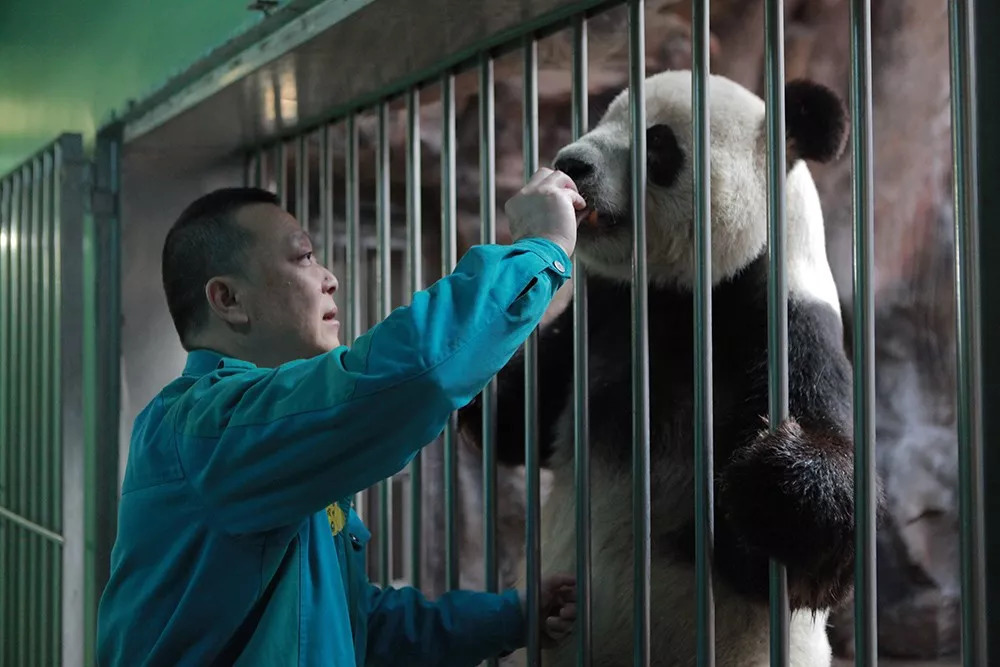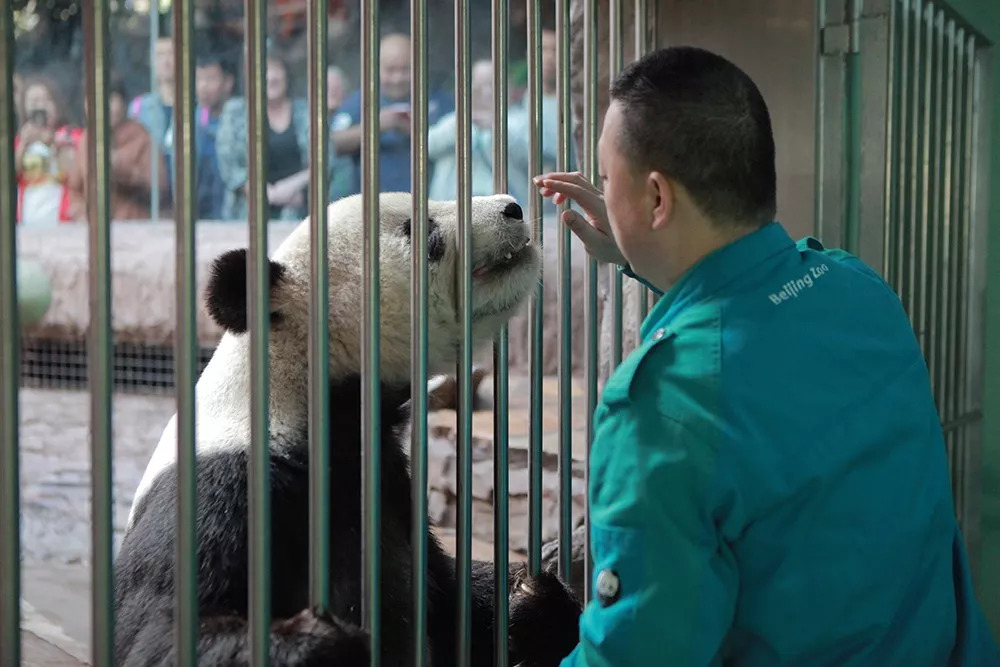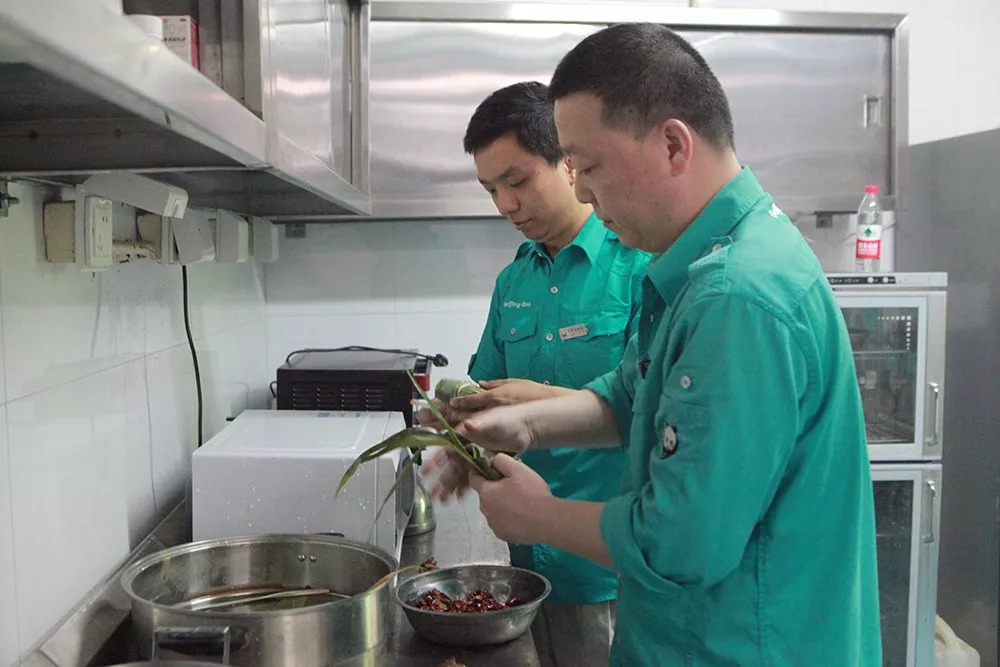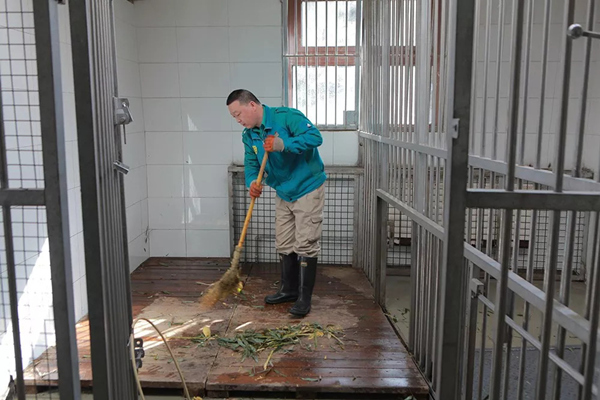Panda “father” for 30 years
Source: People’s Daily Online
4 pm is dinner time in the panda enclosure. Ma Tao puts the dinner he has prepared at the door of the panda house – eggs, porridge, steamed corn bread and bamboo shoots. The 20-year-old giant panda, Gugu, will eat them from the ground.

Ma Tang feeds the panda. (Photo/ Beijing Role Model)
Ma Tao’s daily tasks as the head of the Beijing Zoo panda team include feeding pandas morning and night, cleaning the panda house and writing observation reports. Listed on “Beijing Role Model” and chosen as “The Best Worker of the Capital”, Ma has been a giant panda “father” for 30 years.
In 1989, 19-year-old Ma Tao came to the Beijing Zoo Panda Pavilion. His roles included preparing food, sanitation, artificial breeding, animal training and behavioral observation. After years of learning about these incredible animals, he is now an excellent breeder.
Now there are 13 members in the Beijing Zoo panda team. Many of them graduated from animal breeding majors at university, but in practice, they still need to accumulate experience.
“Traditionally, we use one-on-one mentoring, to make sure that every new employee has an experienced mentor to guide them, and also technical communication between peers,” said Ma.

Ma Tao interacts with the panda. (Photo/ Beijing Role Model)
“The oldest panda here is ‘Dadi’, born in 1992. The youngest was born in 2015,” said Ma, as he introduced the 17 giant pandas at the Beijing Zoo.
Both visitors from China and further afield love the giant panda for its cute charm. However, contrary to its docile appearance, it is a savage animal. The Beijing Zoo included the giant panda in a list of 27 wild animals for public awareness. It is incredibly territorial and may attack if it feels threatened, so the breeder always has to be careful and keep a safe distance.
As a national Class I protected species of China, the giant panda has the title of “national treasure”. Compared with other species, it is more difficult to breed a panda.
“In addition to hard work, the most important thing for the job is to care with love,” said Ma.
“For example, if you find that the panda doesn’t have an appetite, you need to reflect on what may be the issue, and whether any external conditions are interfering with its appetite.”

Ma Tao prepares food for the panda. (Photo/ Beijing Role Model)
After years of getting to know these pandas, Ma is familiar with the temperament of each one. “You have to think about it from the animal’s point of view, and take care of it as if it is your child,” Ma said, “To love them, not spoil them, you must use scientific methods.”
“My job is very common. It gets a high level of attention because I work with ‘national treasures’,” Ma said modestly. He may think his job is ordinary, but without the work of people like Ma, the giant panda could never return to the wild.
In 2015, the results of the fourth national giant panda survey released by authorities showed that by the end of 2013, the number of wild giant pandas in China reached 1,864, the number of captive giant pandas reached 375, and the number of protected habitat areas for pandas increased to 67.
Due to these efforts, in 2016, the International Union for Conservation of Nature announced that pandas had been reclassified from “endangered” to “vulnerable.”

Ma Tao cleans the panda house(Photo/ Beijing Role Model)
When Ma joined the Beijing Zoo, there were only three resident giant pandas. Seeing the improved zoo conditions and the growing number of pandas being born, Ma is overjoyed.
“To do an ordinary job for a lifetime. I feel it’s worthy, ” he said with satisfaction.












